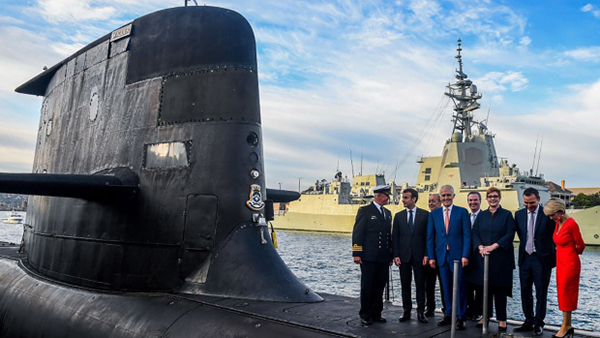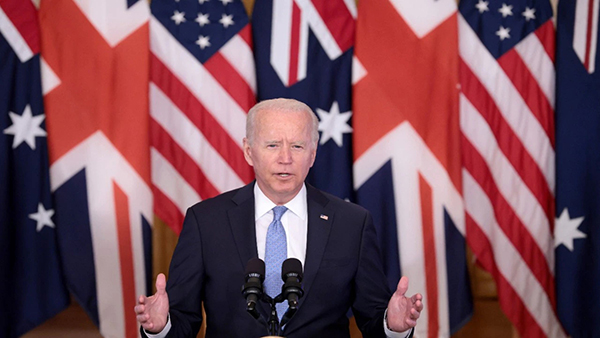AUKUS Makes Waves
The US, Britain and Australia announced, on 15 September, a new trilateral security alliance for the Indo-Pacific to take on the threats of the 21st century and allow for greater sharing of defence capabilities, including help Australia acquire nuclear-powered submarines, in a bid to counter China’s growing power in the strategically vital region.
Unveiling the ambitious security initiative, US President Joe Biden, UK Prime Minister Boris Johnson and his Australian counterpart Scott Morrison in a joint statement said their move will promote stability in the Indo-Pacific and support of their shared values and interests. “We are taking another historic step to deepen and formalise cooperation among all three of our nations because we all recognise the imperative of ensuring peace and stability in the Indo-Pacific over the long term,” President Biden said at the virtual launch of the new alliance known as AUKUS on Wednesday.
Biden said that the three countries will update and enhance their shared ability to take on the threats of the 21st century, just as they did in the 20th century, together. The United States, Australia, United Kingdom have long been faithful and capable partners and we’re even closer today. Today, we’re taking another historic step to deepen and formalise cooperation among all three of our nations because we all recognise the imperative of ensuring peace stability in the Indo-Pacific over the long term, he said.
Interestingly, the announcement of AUKUS came a week before a meeting of Quad leaders to be hosted by US President Biden in Washington on September 24. The meeting was attended by Prime Minister Narendra Modi, Prime Minister of Australia Morrison and Japanese Prime Minister Yoshihide Suga.
What is AUKUS
Under the AUKUS alliance, the three nations have agreed to enhance the development of joint capabilities and technology sharing, foster deeper integration of security and defence-related science, technology, industrial bases and supply chains.
Under the first major initiative of AUKUS, Australia would build a fleet of nuclear-powered submarines with the help of the US and the UK, a capability aimed at promoting stability in the Indo-Pacific region.
France Indignant
The announcement is significant not only because it involves the transfer of nuclear submarine technology to Australia but also since it implies the cancellation of an ongoing U.S.$90 billion project by France to manufacture conventional submarines for Australia.
Paris recalled its Ambassador to Australia, accusing Canberra of “backstabbing” and betrayal. When Australian and French ministers met less than a month earlier, French officials said there had been no talk of cancelling the deal. The two sides had even issued a joint statement indicating the continuation of the submarine programme. But Australia, it seemed, was secretly negotiating a deal with the U.K. and the U.S. Beyond Canberra’s unceremonious termination of the submarine contract, France was angry because it was kept in the dark about the discussions surrounding the new pact.
Chinese Reactions
In Beijing, the Chinese foreign ministry sharply criticised the trilateral military partnership, saying it would closely monitor the pact that will gravely undermine regional stability and aggravate the arms race and hurt international non-proliferation efforts.
Chinese State Councillor and Foreign Minister Wang Yi, on 29 September, in a phone conversation with the Malaysian and Bruneian foreign ministers, said the AUKUS move was likely to bring about five dangers to the region.
- Firstly, it will cause risks of nuclear proliferation. While the United States has unilaterally imposed sanctions on countries developing enriched uranium technology, it gave Australia a green light, which will inevitably give rise to more risks of proliferation of nuclear technology and materials, impacting the global non-proliferation regime.
- Secondly, it will induce a new round of arms race. Australia’s move will break the strategic balance in the region. It could not be ruled out that other countries would follow the move to wage a new round of arms race, even crossing the nuclear threshold.
- Thirdly, it will undermine regional prosperity and stability. AUKUS will surely to create tensions, casting a shadow on the region’s peace, stability, and development.
- Fourthly, it will sabotage the building of a nuclear-weapon-free zone in South-East Asia.
- Fifthly, it will revive the Cold War mentality. AUKUS, in line with the Quad, complies with and serves the US-led Indo-Pacific strategy, seeking to overturn the current status quo and start all over again, with an eye to provoking rivalry among blocs in the region and ushering in geopolitical zero-sum games.


What does AUKUS mean for India
Australia will receive top quality nuclear submarine technology from the U.S. and the U.K., strengthening China deterrence in the Indo-Pacific. But if Australia and the U.S. could deceive France, a North Atlantic Treaty Organization (NATO) partner, what is to prevent them from doing the same with lesser allies?
The Indian Navy presently dominates the Eastern Indian Ocean, but its conventional underwater capability has been shrinking. An Indian plan to develop a fleet of nuclear attack submarines has elicited no offer of help from the U.S. that does not share its prized nuclear submarine technology with even its closest allies; all except Australia, evidently.
Washington’s willingness to help Canberra build SSNs raises the possibility that Australia could deploy nuclear submarines in the Eastern Indian Ocean well before India positions its own. The Indian Navy is not building submarines at a pacecommensurate with needs. Notwithstanding shared concerns over China’s growing submarine presence in the region, however, Indian officials are not comfortable with the prospect of friendly SSNs in India’s backyard.
India is being careful in its official response to AUKUS. The bottom line for New Delhi is that it cannot be seen to be taking sides in a feud among friends – France, U.S., U.K. and Australia – some of India’s closest partners.
Officially, foreign secretary Harsh Vardhan Shringla distanced Quad — “a plurilateral grouping of four countries that have a shared vision of their attributes and values” — from AUKUS — “a security alliance between three countries”, adding that “from our perspective, it is neither relevant to the Quad nor will it have any impact on its functioning”.
Comments
The objective of AUKUS is “to deal with rapidly evolving threats”, and it envisages closer intelligence-sharing and cooperation in areas of Artificial Intelligence (AI), cyber-warfare and quantum computing. The US, UK and Australia are already part of the Five Eyes intelligence network, together with Canada and New Zealand. And so, up to this point, AUKUS would have been seen as an attempt to shore up an Anglo-Saxon grouping in the Indo-Pacific, attracting dismissive commentary from Beijing and mild speculation about how AUKUS would engage with Quad. However, it is the abrupt cancelling of the submarine deal that has shocked and angered France.
There was no denying a sense of wariness in New Delhi. It did not help that AUKUS took the focus away from the Quad. The agreement suggested preferential treatment on the part of Washington for a close Anglo-alliance partner. That led some in Delhi to wonder why the U.S. should make an allowance for one Quad partner and not another.
The Indian Navy’s indigenous SSN programme requires a nuclear reactor more powerful than the one installed in the Arihant (a non war-fighting platform). Some in India were hopeful that the U.S. would consider providing the Indian Navy with nuclear submarine propulsion technology.
New Delhi must seize the opportunity to push France to transfer its nuclear propulsion technology. Despite the less than satisfactory experience with the Project 75 ‘Scorpene’ class submarine programme, India, some say, should accept French assistance with building an SSN reactor.

















